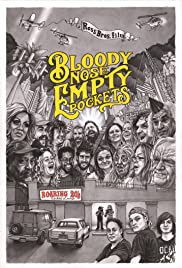
A portrait of the lives of a disparate group of patrons and employees at an American watering hole today.
You May Also Like

When a fugitive begins a romance with the woman hiding him from the law, it becomes uncertain whether he will ever escape the shadow of his heinous crimes–or the detectives hot on his trail.

LAST MAN FISHING is a cinematic look at the vastly changing seafood system through the lens of small-scale fishermen across the United States. Narrated by best-selling author Mark Bittman, the film explores the dichotomy between t…

A group of landless Hungarian peasants accept work as migrant-laborers on a farm in northern Germany where the wages are good, and the wives and family are allowed to accompany them. Though it is in the midst of World War II, they are relatively well-off. However, they glimpse the treatment accorded to POWs and others who are not so gently treated, and at the conclusion of the year’s harvest, they choose to return to Hungary and are quickly swept up in the tides of war. This film is part of a series of films by award-winning, well-respected director Zoltan Fabri who devoted much time and effort chronicling the struggle against fascism.

Tells the remarkable story of Moses “Shyne” Barrow, the Grammy Award-winning musician turned politician. A rising star in the late 1990s, Shyne’s promising rap career was cut short after being charged in a high-profile New York nightclub shooting, along with rap impresario Sean “Puffy” Combs. Shyne was convicted in 2001 and sentenced to ten years in prison, while Combs was acquitted. After prison, Shyne reemerged in his native Belize, where he transitioned from music to politics, ultimately becoming the Leader of Opposition Party. His journey is one of redemption, resilience, and transformation. This documentary provides an intimate look at Shyne’s personal evolution as he navigates fame, incarceration and a return home to Belize, where he finds new purpose and strives to lead his country to a brighter future.

This film is made up several sketches in which certain actors play several real or fictional roles to a background of rock music. The lead character, played by Godard himself, is an annoyingly perfectionist film-maker determined to wring every last drop of the finest performance possible from his stars.

Two seconds into the bubbling synth sounds of its theme song will have a child of the 1980s or ‘90s exclaiming “Reading Rainbow!” Such is the beloved and ubiquitous nature of the classic children’s literary television show that introduced millions of kids to the wonder and importance of books. Not only did the series insist on having kids speak to kids about their favorite stories, but Reading Rainbow introduced the world to one of the most adored television hosts of all time in LeVar Burton. Thanks to his direct, non-patronizing and, most importantly, kind delivery, Burton became a conduit to learning for children of every background—an entrancing guide to subjects unknown.

Paris, 1967. Disillusioned by their suburban lifestyles, a group of middle-class students, led by Guillaume (Jean-Pierre Léaud) and Veronique (Anne Wiazemsky), form a small Maoist cell and plan to change the world by any means necessary. After studying the growth of communism in China, the students decide they must use terrorism and violence to ignite their own revolution. Director Jean-Luc Godard, whose advocacy of Maoism bordered on intoxication, infuriated many traditionalist critics with this swiftly paced satire.

Explores the possibility for the global community to overcome challenges like climate change and reach a brighter future through the power of nuclear energy.